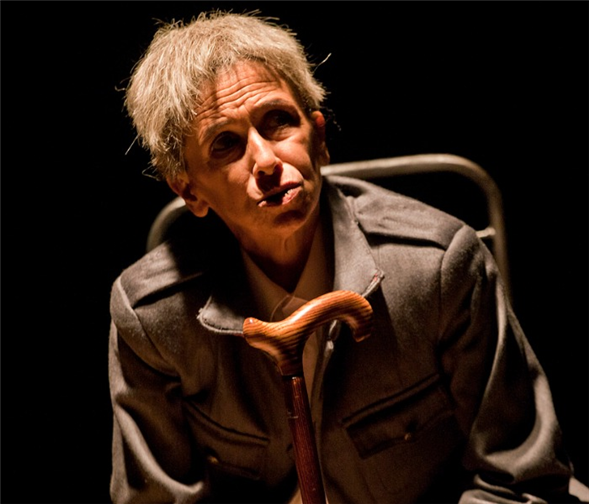Translate Page

In The Emperor, Haile Selassie's servants tell his story, and they're all played by Kathryn Hunter
---
The audience never sees His Imperial Majesty Haile Selassie in The Emperor, Colin Teevan's stage adaptation of Ryszard Kapuscinski's eponymous book. But you get a vivid picture of the 20th-century Ethiopian autocrat and his court through memories shared by his eleven loyal servants, all portrayed by Olivier-winning actress Kathryn Hunter.
In the production, which originated at London's Young Vic and is now running at Theatre for a New Audience, Hunter nimbly plays a motley cast of characters, including His Majesty's pillow holder, the imperial purse bearer and the man who cleaned up whenever the Emperor's lapdog peed -- sometimes on important guests.
"There are about 33 or so speakers in Kapuscinski's original -- we thought that was maybe a bit too much," says Hunter, who is careful to call the controversial book a novel, not a work of nonfiction. "Kapuscinski caused quite a stir and even outrage because he presents the story in the form of verbatim interviews, even though he never says that's what it is," Hunter explains. "Of course, he was playing with the form and creating a kind of fiction journalism. Yes, it is about the Emperor Haile Selassie, but it is also a parable about power and power structures, how they are made and maintained. At the heart of the book, I think, is the question: What is the art of governing?"
Born in New York, Hunter was raised in England and attended London's Royal Academy of Dramatic Art. In her early twenties, she survived a terrible car crash that broke her back, pelvis, an arm, smashed a foot and collapsed a lung. Perhaps that's why, after recovering, she gravitated toward physical theatre, training with Complicité, a British company influenced by the Jacques Lecoq school. "My whole conception of physical storytelling changed," she says. "In the sense of the body being able to tell a story -- the shape of the spine, where the body is in the space, does it move fast or slow or slide or crouch?"
Hunter is well-known for her ability to metamorphose on stage, regardless of a character's gender, age or even species. In 2013 in NYC, she played a sentient chimpanzee who learns to speak English in Kafka's Monkey and, a few months later, became an ageless, genderless Puck in Julie Taymor's take on A Midsummer Night's Dream. In London, she has fearlessly tackled the titular kings in both King Lear and Richard III, and is set to play the lead in Timon of Athens at the Royal Shakespeare Company this December. "I never planned to have a career of playing males, but I was always more attracted to the male parts," she says. "I think often they were more interesting -- they had more to say and do. And thinking oneself into maleness is just observation, really. I think that's our job, for an actor to get into the skin of other people."
In the case of The Emperor, Hunter discovered the challenge wasn't getting into the many characters' skins but figuring out how to fill in their contours. "The people are not very differentiated in the book; you basically begin to hear Kapuscinski's voice a lot," Hunter says. "So I had to imagine and just invent."
For inspiration, she watched documentaries featuring dignitaries from Selassie's regime. "You become a bit of magpie and you make connections," she says, noting that a large, toothless interviewee became the basis for the servant who tends to the dog. "There was another gentleman who was very sharp and quick and had a bit of a sense of humor about Selassie, and I went, 'Yes, I'll make him the pillow bearer.'"
Hunter also traveled to Ethiopia's capital Addis Ababa to "pick up the vibe" of the country and culture. She visited the palaces, the university and the "Red Terror" Martyrs' Memorial Museum that commemorates those who died under the Derg government, which ousted Selassie in 1974. "The terrible irony is that the regime that came after made the Emperor look like a saint," she says.
Although Hunter is the central performer in The Emperor, she is not alone on stage. Throughout, a young Ethiopian musician, Temesgen Zeleke, plays the krar, a lyre-like instrument native to his country, and portrays a few supporting characters. "My favorite is a young revolutionary, who shouts and protests and is taken away," he says.
As the sole Ethiopian involved in the production, Zeleke has a clear-eyed perspective on its allegorical narrative. "It is meant to be a story about how power everywhere can be corrupt and how bad it is when one person has too much power," he says. "I hope that it opens a window to our country that has one of the oldest histories in the world and is really changing so much today -- we hope in a positive direction."
---
TDF MEMBERS: At press time, discount tickets were available for The Emperor. Go here to browse our current offers.
Gerard Raymond is an arts journalist based in New York City.
Kathryn Hunter in The Emperor at the Young Vic. Photos by Simon Annand.